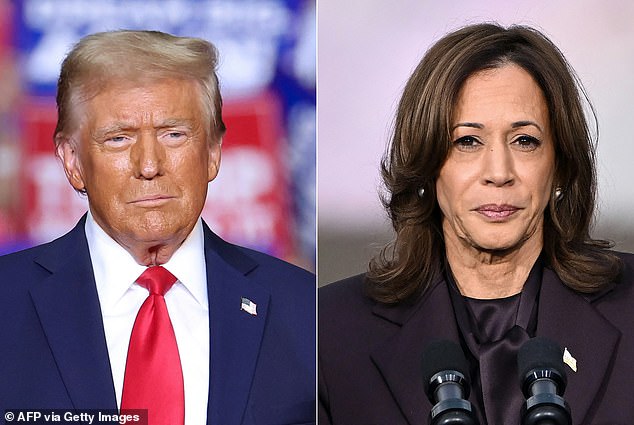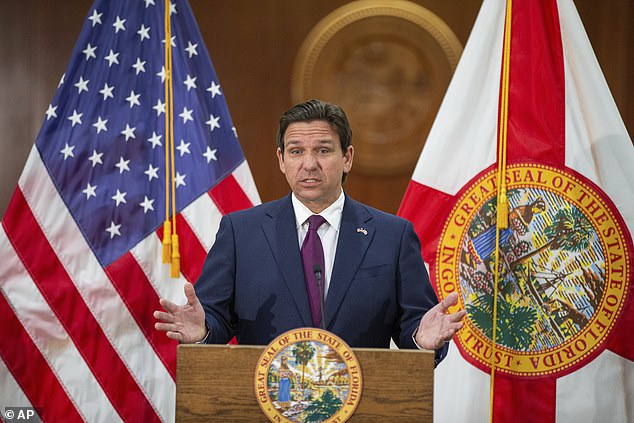PETER HITCHENS: Marijuana isn’t harmless… proven by the smug certainties of the pro-dope lobby going up in smoke
Within a few years, marijuana went from a vile brain toxin used mainly by losers and dropouts to a supposedly harmless miracle drug and a supposedly mild intoxicant at the heart of a billion-dollar business.
It’s tolerated in all kinds of places, from New York City to Germany (since April Fools’ Day). And a seemingly unstoppable campaign hopes to make it legal everywhere, including here. Will this happen?
The force behind the campaign for legal cannabis is so strong (and so rich) that both President-elect Donald Trump and Vice President-elect Kamala Harris embraced the policy in the months before the US election.
Mr. Trump was optimistic. He incorrectly predicted last August that personal amounts of marijuana for adults would be legalized in Florida, “whether people like it or not.” He seemed to enjoy it, stating that “a person shouldn’t be a criminal in Florida when it’s legal in so many other states.” (As of April 2024, recreational use is legal in 24 states).
A cannabis store is boosting commerce in Los Angeles. California, where cannabis has long been legal, is now full of both legal and illegal marijuana shops
He added, echoing the arguments of legalizers around the world: “We don’t need to ruin lives and waste taxpayers’ money by arresting adults with personal amounts of it on themselves.”
For her part, Ms. Harris pledged, “I will legalize recreational marijuana, break down unjust legal barriers and create opportunities for all Americans to succeed in this new industry.”
Their confidence was not surprising. Nearly $150 million was spent by the pro-legalization campaign, most of which was provided by existing marijuana companies
And yet they both seem to have misjudged the mood. Like Florida, North and South Dakota had pro-marijuana proposals on their ballots on Nov. 5 that would have legalized it for recreational use. But in all three cases, the pro-drug case was defeated.
By far the biggest blow to the marijuana case was the result in Florida. It is a densely populated state that is often visited by American and foreign tourists. But voters refused to approve a constitutional amendment that would have made cannabis legal.
Many were influenced by the strong and intense opposition of the state’s successful and effective governor, Ron DeSantis. He warned that allowing unlimited use of marijuana would flood cities with marijuana smoke and make roads more dangerous, saying, “It would be everywhere.” The state would smell like it. We don’t need that in Florida.”
To pass, the proposal needed 60 percent of the vote, but it received only 56 percent support (5,927,237 in favor; 4,682,004 against). On the same night, voters in South and North Dakota defeated legal marijuana initiatives by more decisive margins. In South Dakota, rejection of legal marijuana was strong: 55.5 percent against (237,228) versus 44.5 percent in favor (189,915).

Both Donald Trump and Kamala Harris supported the campaign to legalize cannabis in Florida during the US elections, but voters rejected an amendment to the state constitution last week.
In North Dakota, the vote was closer, but still final: 52.5 percent (190,107) to 47.5 percent (171,708) in favor. These are not crushing defeats, but they do show what can happen if the anti-legalization movement fights hard. But it appears that America’s near-total surrender to the billionaire lobby for dope legalization is beginning to falter.
Mainstream political support for the so-called ‘legal regulation’ of marijuana is also common in Britain. Labour’s David Lammy, now foreign minister, praised Canada’s legalization of the drug in 2019.
In 2018, former Tory leader and former Foreign Secretary William Haag urged then Prime Minister Theresa May to legalize cannabis, saying that Britain’s drug policy was “inappropriate, ineffective and completely outdated” and that “the fight has been conducted effectively’. about’.
Lord Haag mocked that telling police to stop smoking cannabis was ‘about as timely and relevant as asking the army to restore the empire’. Ireland’s Fianna Fail, a mainstream party, is also toying with decriminalizing cannabis.
The arguments have been the same for a quarter of a century. It is said that cruel laws throw harmless drug smokers in jail for a victimless crime. Racial minorities are treated more harshly than the majority for this crime.
Legalization will allow the state to generate huge new tax revenues, and allow regulation of the drug to prevent nasty, potent versions from entering the market. None of this is true.
The main victims are the families of users, who are trying to cope with the incurable diseases of their children. In Britain, it has been difficult for decades to find anyone sent to prison on a simple charge of marijuana possession.
Police in Britain generally ignore drug smokers if they can, and the usual response is an unregistered ‘caution’ or ‘warning’.
In the US, the ultra-liberal magazine Rolling Stone published a list of the top ten marijuana myths in 2012, one of which was that prisons were full of people prosecuted for marijuana possession. As the magazine said, “About 40,000 inmates in state and federal prisons currently have marijuana-related convictions, and about half of them are incarcerated for marijuana offenses alone,” but “most of them were involved in the distribution. Less than one percent is just about ownership.’ There will now be much fewer of them.
As for the myth of “regulation through legalization,” its shortcomings were clear. The weak police response to marijuana possession has fueled the growth of vast illegal markets throughout the West. Legalization hardly makes any difference. Illegal drugs are cheaper precisely because they are not regulated or taxed.
Colorado, one of the first U.S. states to become legal, initially did well as people flocked from other states to buy legal drugs. But the spread of the legalization movement and the undermining of legal sellers by untaxed illegal sellers have led to a serious decline there.
The main effect of legalization is to make the drug more readily available, without in any way curbing the gang-dominated lawless market. Six years after legalization in Canada, perhaps half of the Canadian market is still in the hands of illegal dealers. How could anyone find out for sure?
California, where cannabis has long been legal, is chock full of illegal marijuana shops. Drug driving is a growing problem (just like here in the UK). The drug has also been linked to antisocial behavior and the decline of previously orderly neighborhoods.
But the other big problem is the mental health problem. Many still claim that cannabis is a miracle cure, although hard evidence of its healing properties remains elusive, and its side effects – as I will show – could make it unappealing anyway.
One of the longest-serving campaigners for dope legalization in the US, Keith Stroup, admitted in a February 1979 interview with a student newspaper that he and his allies would use medical marijuana as “a diversion to give marijuana a good name.” . Which they certainly did. But that’s not all.

Florida Governor Ron DeSantis campaigned against the legalization of cannabis in his state, saying: “It would happen everywhere. The state would smell like it. We don’t need that in Florida.”
What if marijuana is actually bad for you and for society? What if legalization just makes life bleaker and dirtier?
In July 2023, the liberal Washington Post finally debunked the legalists’ myth that Portugal’s weak drug laws had created some kind of paradise of tolerance. One article, illustrated with disheartening images of drug-related misery on the streets, describes how “authorities are closing off warren-like alleys in parks with iron bars and fencing to halt the spread of encampments.” Local residents were fearful, and even the police – now a vocal part of the pro-drug lobby in many countries – blamed the rise in crime on the growing number of people using drugs.
But that’s not all. With many American cities, especially New York itself, reeking of cannabis and victims wandering the streets in often obvious distress, many are questioning the wisdom of allowing its unrestricted use.
Following the publication of two powerful books linking marijuana use to mental illness – Patrick Cockburn’s Henry’s Demons in Britain and Alex Berenson’s Tell Your Children in the US – the smug certainties of the drug’s boosters have faded .
Even the New York Times, the megaphone of liberal opinion, recently published a major, deeply researched article warning: “From Washington State to West Virginia, psychiatrists are increasingly treating people whose use of the drug leads to delusions, paranoia and other problems.” has led. symptoms of psychosis.’
Is it possible that the long and damaging rule of the pro-dope lobby will finally end? Let’s hope so.
